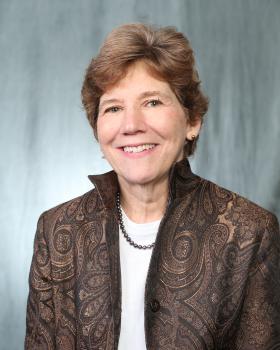Dr. Oatis Awarded R01 Grant for Total Knee Replacement Research

Dr. Carol Oatis, professor of Physical Therapy, is Principal Investigator on a subaward to Arcadia University of $148,304 from University of Massachusetts Medical School, which received the R01 grant from the National Institute of Arthritis and Musculoskeletal and Skin Diseases to research how physical therapy plays a role in Total Knee Replacement (TKR) surgery.
Working with Dr. Patricia Franklin at UMass, Dr. Oatis’s research will look at 360 patients and how different physical therapy practices affect patient functional outcomes after knee replacement.
“Total Knee Replacement is the most common elective surgery,” said Dr. Oatis. “Yet, a pretty substantial number, about a third of patients, get no real functional improvement. So studies have been looking at the factors that influence the outcome, including patient characteristics, like comorbidities and obesity. We know that those characteristics explain some of the variability in outcomes but not all of it, but no one has looked at physical therapy’s role in explaining outcomes yet.”
Although common for older patients and athletes to have TKR surgery due to long-term joint damage, it’s becoming more common for people under the age of 65 to have knee problems due to obesity and lifestyle. According to the American Academy of Orthopaedic Surgeons, more than 600,000 people have TKR each year, a number that is expected to rise to 3 million by 2030 due to increasing obesity rates and an aging workforce, which the organization defines as older adults who have reached retirement age but continue to work. These characteristics and comorbidities–where someone suffers from more than one disease– do not explain all variations in recovery. Dr. Oatis believes this study will help explain why some patients do not improve and may help create physical therapy best practices that can be individualized around patient needs.
In the TKR study, Dr. Oatis and her team at Arcadia and UMass will follow approximately 60 physical therapists in Worcester, Mass., Providence, R.I., and Philadelphia, who each will record intervention data for five to eight patients in their care on specialized software that will prompt them for specific information about their treatments. Additionally, patients will have their own portal to record exercises outside of physical therapy. Functional outcomes will be assessed at six and 12 months, and an assessor will measure performance at 12 months.
“We ultimately hope that this study [will enable us to] utilize physical therapy resources much more efficiently and economically, while simultaneously getting better outcomes,” Dr. Oatis said. “In order to do this, first, we hope to document the variability in practice and see how the variability affects outcomes. Then, second, we hope to be able to use the patient characteristics and the physical therapy interactions to predict how patients will do, so that we can individualize the intervention better.”
The planning for this research started about 10 years ago, Dr. Oatis said, when she met several non-physical therapy doctors and began discussing the recovery of TKR. One of her acquaintances asked if the physical therapy procedures for TKR were all uniform, to which she answered “No,” but there was no data to prove it. Dr. Oatis and her UMass colleagues undertook a study in central Massachusetts that was the first to demonstrate extensive variability in physical therapy interventions with patients following TKR. Now, they plan to take that study and look at a much larger population.
Dr. Oatis said the grant will be used to cover the cost of software development for the patient and physical therapist notetaking portals in order for her team to collect and process data. Additionally, it will pay travel costs for assessors and participation costs for physical therapists. UMass holds a national registry of TKR patients, Dr. Oatis said, and patients have already agreed to participate in outcome studies.
The R01 grant is a Research Project Grant given by the National Institutes of Health each year for health-related research and development, and focuses on investigator-initiated topics. The grant will begin funding the research in early February and be distributed over a three year period. Dr. Oatis expects the study to take approximately three years to complete. However, she sees this as a continuing, long-term project, with the hope of one day expanding upon it.
“As I tell students, research is a long, slow process,” Dr. Oatis said. “We’ve been talking about this study for several years, so my colleagues and I are excited for this great opportunity.”


